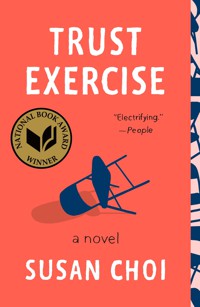Don’t Google These Six Books Before You Read Them

Books are, despite the common adage, often intended to be judged by their covers. Their jacket flaps include marketing copy designed to entice a browser to buy (and, ideally, read) them, teasing the details of their plot, their mood, or the flavor of their prose. But these polished descriptions, like many attempts to summarize compelling stories, rarely convey the excitement of reading a book that genuinely surprises you. Perhaps a better introduction to a title is no introduction—a friend saying “trust me,” for instance. A great book is still great even if you don’t know much about it going in.
In fact, I would venture to say that the sensation of encountering any book for the first time is heightened by knowing nothing—and that for some books a lack of knowledge feels almost essential to the experience. Certain stories are such a bolt from the blue, or transform in such unexpected ways, that their readers should aim to approach them with no information about what’s to come. Some are genre novels accompanied by the fair expectation of a shock. Others present themselves as one type of narrative but turn out to be entirely another. Because of their presence on this list, you can safely assume that the six titles below will offer many kinds of twists—but each richly rewards those travelers who choose to navigate without a map.
Trust Exercise, by Susan Choi
Readers who came to Choi’s novel Trust Exercise in 2019, when it was first published, had the enviable experience of encountering its narrative acrobatics with no preparation. By this point in the book’s life, its status as an exemplar of fiction that upends expectations tips the reader off that there’s something unusual about it. The book’s first half, set at a competitive performing-arts high school in the 1980s, is pure theater-kid nostalgia. Two freshmen, David and Sarah, fall in love. The trope of the toxic drama teacher rears its head: David and Sarah’s enigmatic acting teacher, Mr. Kingsley, manipulates their emotions and desires in the name of art. The way Trust Exercise flips these events in the novel’s second half, casting them in an entirely different light, is an emotionally unsettling experience that opens up provocative questions about ethics, intimacy, and authorship. The novel delights in withholding easy answers. The title is not merely a drama-class game but a literal description of the book’s contents. Just let it happen.
[Read: In defense of spoilers]
Lexicon, by Max Barry
This novel is an unlikely creature: a high-concept thriller about language. Like many literary protagonists before her, Emily Ruff is an orphan who is recruited by representatives of a mysterious, exclusive boarding school. This one teaches the art of coercion. Students who rise to the highest level—given the title of Poets—join a secretive, dangerous society that can shape the world through their powers of persuasion. Emily, a clever talker, takes easily to the rigorous program and becomes a star student. But when she falls in love, the delicate work of wielding language as a weapon is thrown off by the undisciplined force of desire. Lexicon makes a strong case for genre fiction being the most rewarding form for those who go in without prior knowledge. Barry builds a believable sci-fi world—even with its pseudo-fantastical powers—out of the most familiar and banal building blocks, taking the stakes of linguistic misuse to apocalyptic heights.
On Writing, by Stephen King
King’s nonfiction craft book, On Writing, ostensibly fulfills the promise of its subtitle: A Memoir of the Craft. King calls the book “a kind of curriculum vitae” that blends autobiographical scenes with practical advice. (One particular tidbit that stayed with me as a younger writer: Every author has a single ideal reader, whom they should keep in mind as they work.) Yet King cannot stop himself from employing horror. As a child, he was prone to illness and taken to the doctor for painful eardrum lancings, which he describes in graphic detail. The terror only grows as King narrates the pitfalls of his adulthood, such as his addictions and then his unexpected, grueling recovery from a near-fatal accident. What begins as a book on writing with some personal material woven in ends up feeling like—what else?—a Stephen King novel. Readers who come to it for the advice alone will be rewarded and shaken by the storytelling that follows.
[Read: How Stephen King teaches writing]
To Name the Bigger Lie, by Sarah Viren
At first, To Name the Bigger Lie seems like a straightforward coming-of-age story. As a high-school student in 1990s Tampa, Florida, Viren falls under the sway of her charismatic teacher Dr. Whiles, who is intent on pushing his students to question the nature of the truth. His pedagogy involves exposing his class, often uncritically, to conspiracy theories that include Holocaust denialism. Years later, in 2016, Viren sets out to write a book that treats that period in her life as an allegory for the rise of fascism in the United States. But, partway through the writing, her wife—an academic, like Viren—is falsely accused of sexual harassment, and the ensuing Title IX investigation becomes part of Viren’s narrative. The surprising convergences that Viren finds between the case and Dr. Whiles’s teaching—both of which turn out to be fraught, harmful ways of trying to access the truth—culminate in a chilling interrogation of the fact-finding methods that our institutions rely on.
Natural Beauty, by Ling Ling Huang
Huang’s debut novel is set in the wellness industry, fertile ground for bodily unease. The narrator, a young classical musician, abandons a promising future as a concert pianist to support her parents after an accident. She takes a job at a high-end beauty shop, Holistik, which carries products that are unnaturally effective. As the narrator gets more involved with the family who founded the company, she discovers quintessential hints that something is amiss: evidence of animal experimentation in the laboratory and dramatic physical transformations among the clientele. Still, her financial dependence on the job—and her growing entanglement with the founders—makes it difficult for her to walk away. When the force behind this company’s ethos and practices is finally revealed, it feels at once shocking and foretold from the start.
[Read: You may be surprised by what scares you]
Consent, by Jill Ciment
Ciment has written about the relationship that animates this memoir before. In Half a Life, her 1996 book, she described her marriage to the three-decade-older artist Arnold Mesches, whom she met when she was a 17-year-old student in his art class. Back then, Ciment characterized herself as the seducer. But this book, written after Mesches’s death and the #MeToo movement, asks whether things were so clear-cut. The story of their long marriage is more powerful if the reader experiences it without having read the entire backstory—or is at least willing to abandon their preconceptions. In Consent, Ciment provides so much of the original memoir’s context, even analyzing some of its passages, that to be too rigidly attached to this story’s first version would make its follow-up feel too litigious. Such a reading would minimize the complexity of Ciment’s reckoning. She doesn’t only examine how her marriage began—she also honors the productive artistic partnership that grew out of it, while placing those realities in the context of evolving cultural mores around power and consent.


